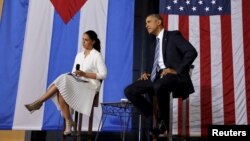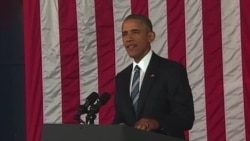President Barack Obama says the United States wants to help Cuban entrepreneurs, and that the best way to do this is for the U.S. Congress to lift the trade embargo against Cuba "once and for all."
Obama told a gathering of several hundred Cuban entrepreneurs and U.S. business people in Havana Monday that "America wants to be your partner."
Despite the fact that the U.S. Congress remains opposed to lifting the trade embargo against Cuba, the Obama administration has been pushing forward with new trade initiatives, and the president's visit to the communist-run country has triggered a wave of new commerce.
"Around this visit, American companies are working ahead with new commercial deals. GE is going to sell more products from energy to aviation technology," Obama said. "Cleber will be the first U.S. company to build a factory here in more than 50 years; they are going to build tractors for Cuban farmers. Starwood is going to be the first U.S. hotel that operates here in more than 60 years. The first Carnival cruise is going to pull into Havana in May."
Obama praised Cuba's government for opening its economy to private enterprise, saying nearly a half-million Cubans are now either small business owners or an employee of one.
"The Cuban economy is beginning to change, and just look at the results. Groups like Cuba Aprende are training a new generation of entrepreneurs," he said. "Today, half a million Cubans, including some of you, are cuentapropistas, running your own restaurants, cafes, beauty supplies or working as artists, seamstresses or taxi drivers. Your businesses employ one-third of the Cuban workforce."
Obama called on Cuba's government to do more to encourage an environment that fosters entrepreneurship, including making it easy for business people to get loans from banks and access markets to buy supplies.
"Some economic models just don't work," Obama said. "If something is not working for 50 years, you should stop doing it. Try something new."
Obama took questions from several entrepreneurs in the audience, facilitated by Cuban-American journalist Soledad O'Brien.
Obama said he wanted to buy some T-shirts made by Cuban graphic designer Idania Del Rio, who said her shop has grown to 14 employees and now sells 25 products. Obama praised her effort to start a business that is not part of Cuba's traditional economy.
"Young people who have ideas cannot be restricted to the traditional exports where you are not high up on the chain," he said. "If all you are doing is selling commodities, it is hard to spur economic growth."
The White House says that while Cuba's government has increased private employment from 145,000 in 2009 to approximately 500,000 in 2015, it still restricts licenses to 201 service-oriented jobs like restaurant owner, hairdresser, sign painter and taxi driver.
Brian Chesky, co-founder and CEO of Airbnb, said his business expanded to Cuba one year ago with the help of the U.S. government. He said 20 percent of all Americans visiting Cuba are now using Airbnb to stay with Cuban hosts instead of at traditional hotels.
Obama said Internet access is the key to Airbnb's success and he urged Cuba's government to invest more to broaden the Internet's reach in Cuba. The White House says only 5 percent of Cubans have access to the Internet, one of the lowest Internet penetration rates in the world.







